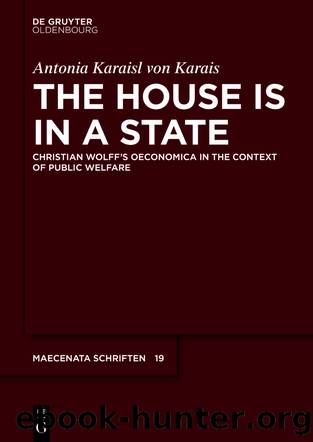The House is in a State by Antonia Karaisl von Karais

Author:Antonia Karaisl von Karais
Language: eng
Format: epub
Publisher: De Gruyter
Published: 2021-01-18T09:57:22.109000+00:00
4.5.2
A priori medicine contra institutional innovation
Wolffâs ideal of medicine as a science and his view on public health institutions are predictably interrelated. This is evident when comparing Wolffâs suggestions to new developments in the eighteenth century in the field of collective medicine, specifically in the field of hospitals and responses to epidemics. Wolffâs own view is wedded to a systematic, universalist idea of medicine. Vested in an academic tradition he steers clear from practice-informed approaches that started setting the scene in Prussia.
At Wolffâs time hospitals would not have been considered a classic calling point for a ânormalâ individual. Instead, true to their medieval beginnings, hospitals in Europe were charitable institutions caring for more than curing specifically the destitute: lepers, cripples, paupers, vagrants and other individuals living at the fringe of society.685 More recent studies have tried to revise the notion that these institutions did not perform therapeutic functions; either way, the impression remains that hospitals were not intended for the population at large but only the destitute. As that, they performed a function of social control by containing people with contagious diseases and separating the mentally unwell out from the rest of society to care for them in both physical and spiritual respects.686 Wolffâs brief treatment of hospitals in his natural law has to be understood in that sense: he only mentions nosocomia, institutions intended for specifically poor people with health issues, and also infirmaries for veterans. These institutions count as a mandate to the state even though Wolff acknowledges the involvement of the Church in that matter. The overall impression is descriptive of reality more than prescriptive of an ideal; as it is, however, the very brief treatment of hospitals may also be due to the fact that Wolff explicitly reserves the topic for the Politica, not natural law â an endeavour cut short by his own gout.687
Amidst religiously motivated health care initiatives, secular efforts over public healthcare had had their precedents. Already in the late Middle Ages, with the growth and consolidation of cities, the sheer volume could not be met by the efforts of the church only. The citizenry stepped in to fill gaps, with joint charitable and practical perspectives. Having an uncontrolled agglomeration of poor people heightened the danger of diseases and epidemics, therefore posing a risk to the rest of the population. Moreover, public health institutions, such as the nosocomia, were de facto functioning as ptochotrophiae, as feeding institutions for the poor who, ill or not, could not provide for themselves. On one hand, therefore, the reduction and proper care for the poor would reduce the risk of widespread illness in the first place; in the second instance, separating the poor from the ill and creating appropriate institutions for either would mean freeing up resources for the latter, as Vives suggested.688 The distinction between these institutions is also defined in Wolffâs natural law although he does not spend an egregious amount of time on either. He merely mentions the nosocomium as a place where specifically sick paupers receive medical care, the ptochotrophium as a facility to feed the poor.
Download
This site does not store any files on its server. We only index and link to content provided by other sites. Please contact the content providers to delete copyright contents if any and email us, we'll remove relevant links or contents immediately.
The remains of the day by Kazuo Ishiguro(8999)
Tools of Titans by Timothy Ferriss(8395)
Giovanni's Room by James Baldwin(7346)
The Black Swan by Nassim Nicholas Taleb(7129)
Inner Engineering: A Yogi's Guide to Joy by Sadhguru(6794)
The Way of Zen by Alan W. Watts(6614)
The Power of Now: A Guide to Spiritual Enlightenment by Eckhart Tolle(5781)
Asking the Right Questions: A Guide to Critical Thinking by M. Neil Browne & Stuart M. Keeley(5775)
The Six Wives Of Henry VIII (WOMEN IN HISTORY) by Fraser Antonia(5515)
Astrophysics for People in a Hurry by Neil DeGrasse Tyson(5189)
Housekeeping by Marilynne Robinson(4447)
12 Rules for Life by Jordan B. Peterson(4304)
Ikigai by Héctor García & Francesc Miralles(4274)
Double Down (Diary of a Wimpy Kid Book 11) by Jeff Kinney(4272)
The Ethical Slut by Janet W. Hardy(4253)
Skin in the Game by Nassim Nicholas Taleb(4248)
The Art of Happiness by The Dalai Lama(4130)
Skin in the Game: Hidden Asymmetries in Daily Life by Nassim Nicholas Taleb(4006)
Walking by Henry David Thoreau(3962)
